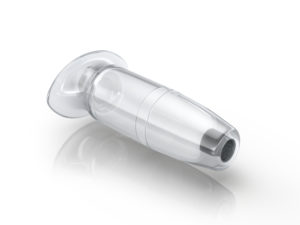
South San Francisco-based Genentech, a member of the Roche Group, designed its Susvimo ranibizumab injection (100 mg/mL) for intravitreal use via ocular implant for treating people with wet, or neovascular, age-related macular degeneration (AMD) who have previously responded to at least two anti-vascular endothelial growth factor (VEGF) injections.
Formerly called Port Delivery System with ranibizumab, Susvimo is now the first and only FDA-approved treatment for wet AMD that offers as few as two treatments per year, according to a news release. In June, the FDA accepted Genentech’s Biologics License Application (BLA) for the platform.
Susvimo delivers ranibizumab continuously as an alternative to eye injections needed as often as once per month, Genentech said. The implant is surgically inserted into the eye during a one-time, outpatient procedure and refilled every six months while, if necessary, supplemental ranibizumab treatment can be administered to the affected eye when the Susvimo implant is in place.
“Susvimo represents a major advancement in the treatment of retinal disease, and is an important new option for patients with wet AMD,” Chief of Retina Service at Wills Eye Hospital in Philadelphia Dr. Carl Regillo said in the release. “With Susvimo, my patients now have an option that can help them maintain their vision as well as anti-VEGF injections, but on a more manageable twice-yearly treatment schedule.”
Approval comes on the back of results from the Phase III Archway study primary analysis that showed wet AMD patients treated with Susvimo achieved and maintained vision gains equivalent to monthly ranibizumab injections. Only 1.6% of Susvimo patients received supplemental ranibizumab treatment before their first refill.
The implant was also well tolerated with a favorable benefit-risk profile, but it has been associated with a three-fold higher rate of endophthalmitis compared to monthly intravitreal injections of ranibizumab. Many of these events were associated with conjunctival retractions or erosions. In clinical trials, 2% of patients receiving the implant experienced at least one episode of endophthalmitis.
Genentech said Susvimo will be made available in the U.S. in the coming months.
“We believe that Susvimo can help people with wet AMD preserve their vision while potentially alleviating the treatment burden associated with current standards of care,” added Genentech CMO & Head of Global Product Development Dr. Levi Garraway. “Susvimo’s approval builds on Genentech’s long-standing commitment to people living with vision-threatening conditions.”

